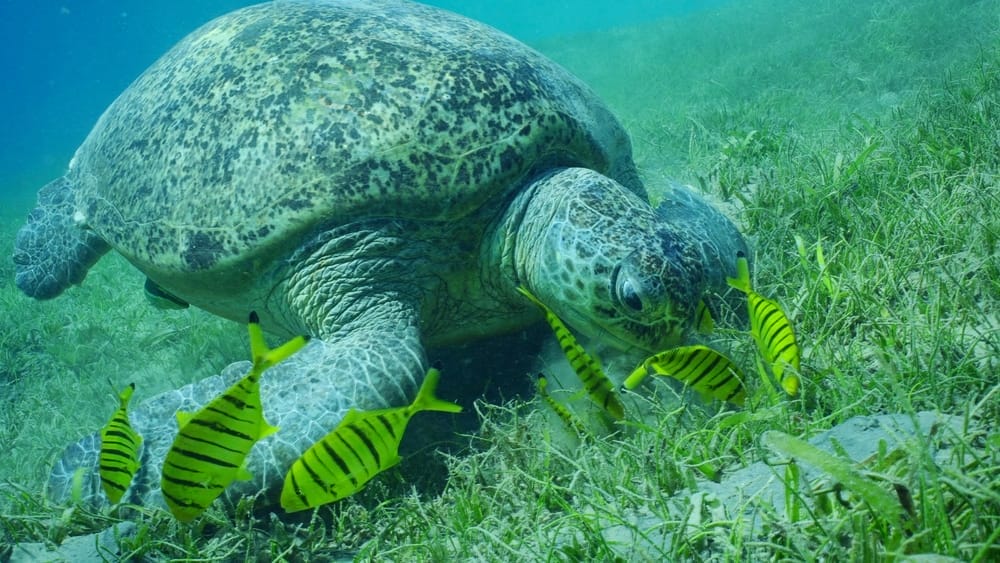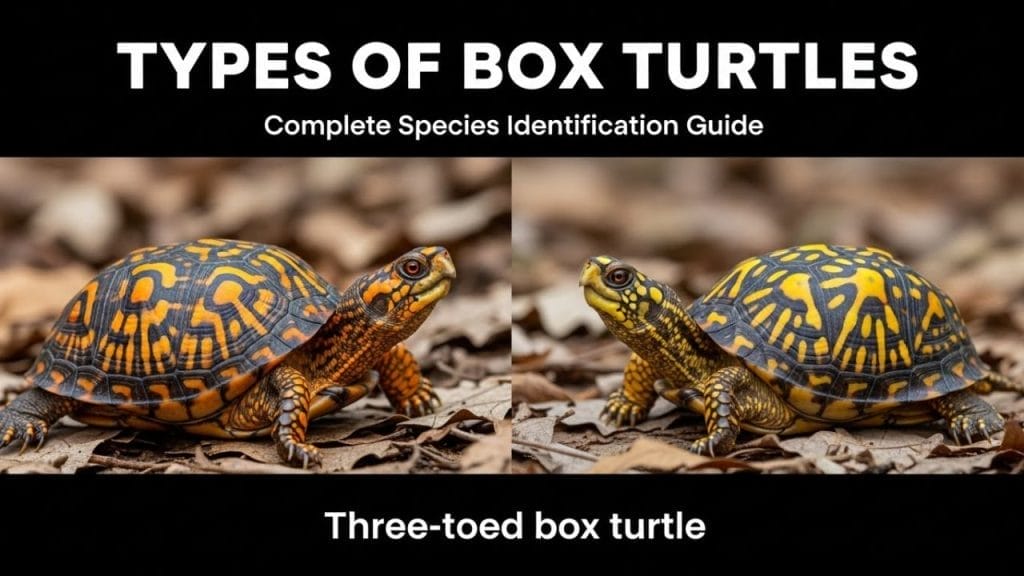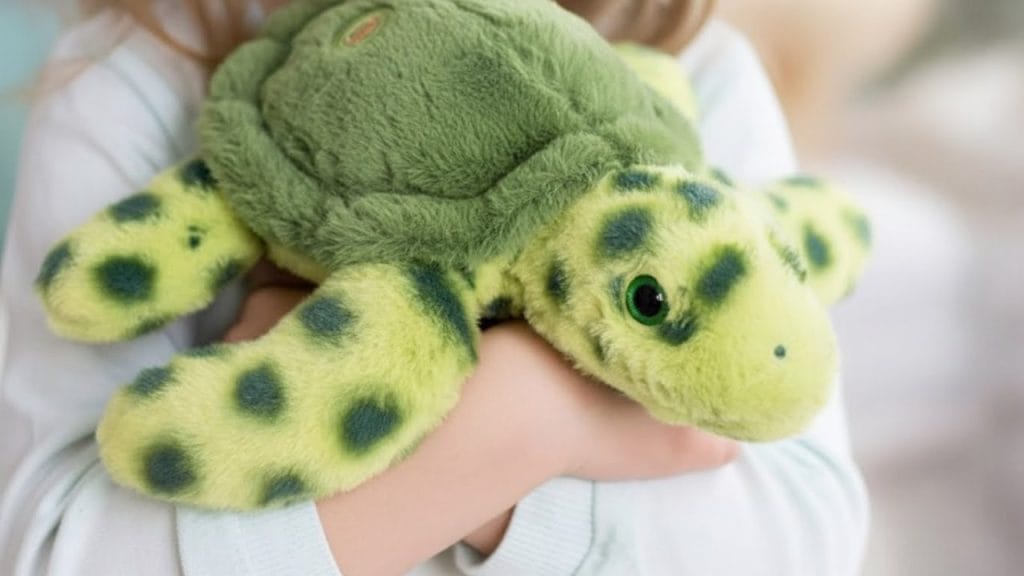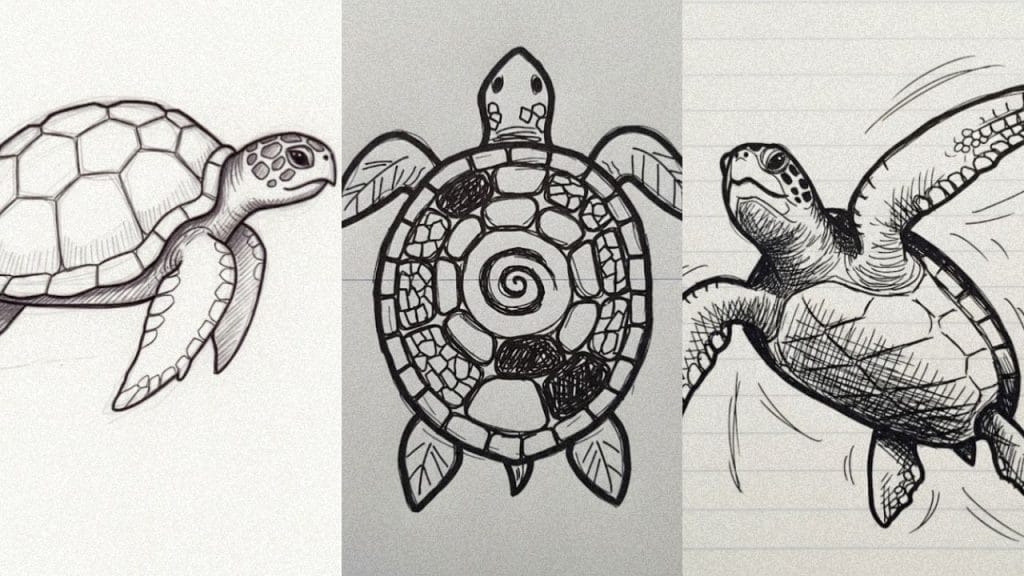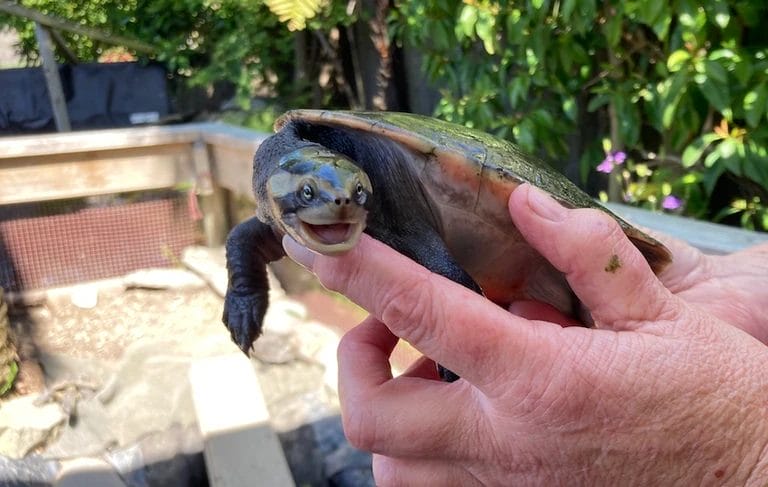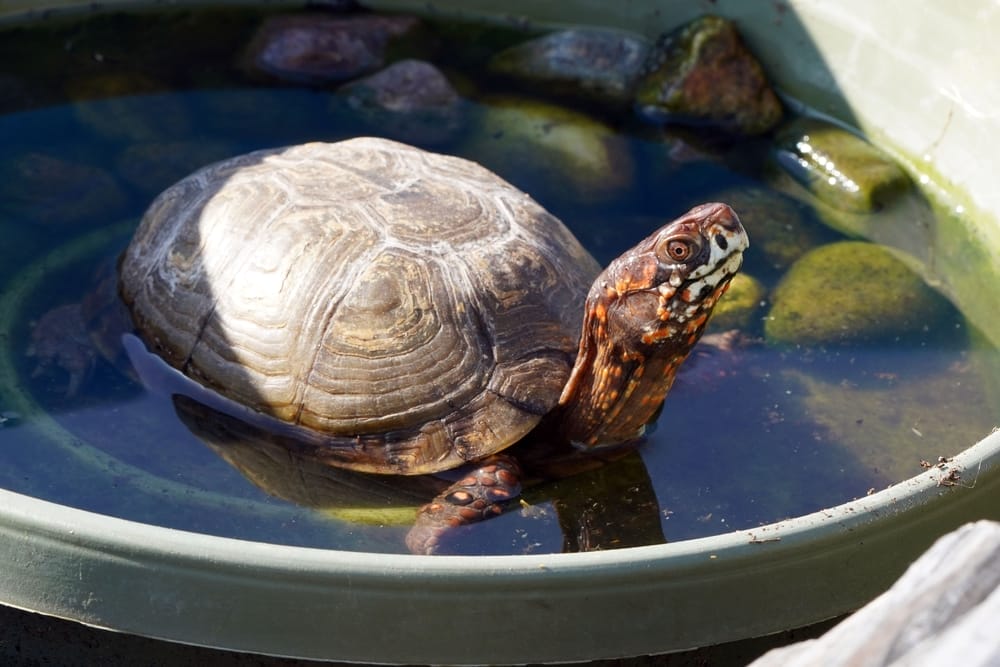Can Turtles Transmit Diseases To Humans? [Health Risks]

This post was created with help from AI tools and carefully reviewed by a human (Muntaseer Rahman). For more on how we use AI on this site, check out our Editorial Policy.
I used to think turtles were low-risk pets. Quiet, calm, and way less trouble than a dog or cat. But that idea changed fast when one of my turtles got sick — and I ended up getting sick right after.
That got me digging. Can turtles really make people sick? Turns out, yes. Turtles can carry germs that don’t harm them but can mess you up big time — especially Salmonella. And that’s not the only thing.
In this post, I’ll break down the real health risks of keeping turtles, the diseases they can pass to humans, and what you can do to stay safe. No fear-mongering, no sugarcoating — just facts that every turtle owner should know.
Need To Talk With A Turtle Vet Right Now?
Can Turtles Really Transmit Diseases to Humans?
Yes, they can. Turtles might look harmless, but they can carry germs that don’t affect them much — but can make you sick.
The biggest one is Salmonella, but it’s not the only concern. These germs live on the turtle’s skin, in their poop, in the water they swim in, and even on their tank decorations.
You don’t have to get bitten to catch something. Just touching the turtle or anything inside the tank, then touching your mouth, eyes, or food — that’s enough.
And no, washing your turtle doesn’t “clean off the bacteria.” It stays with them. They’re natural carriers.
This isn’t about blaming turtles — it’s just how their bodies work. But if you’re not careful, especially with kids in the house, things can go south quickly.
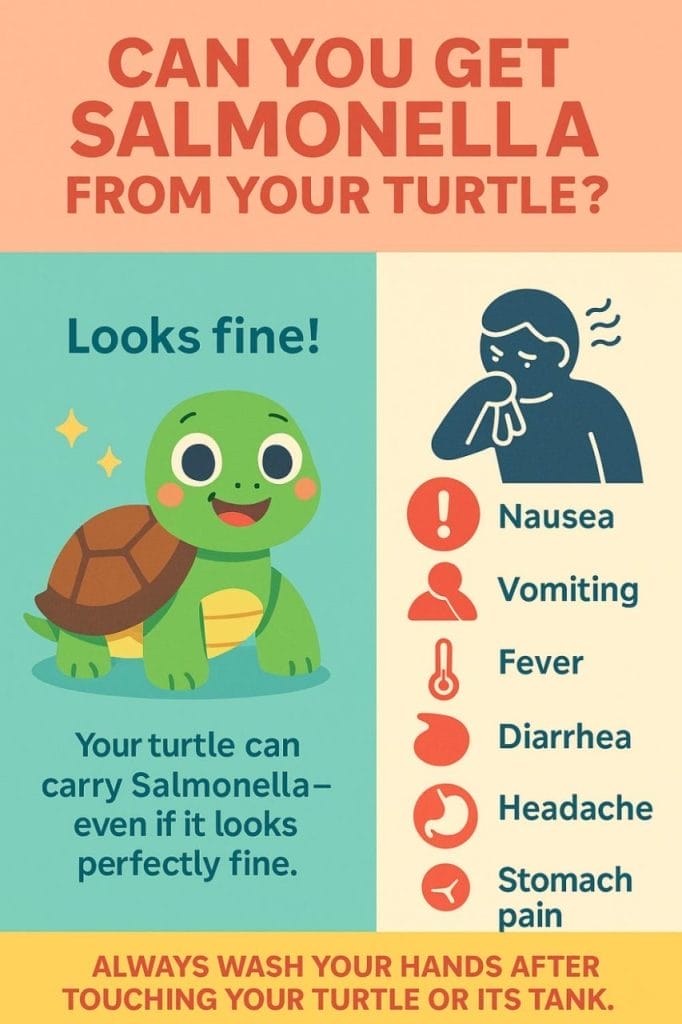
Most Common Turtle-Transmitted Diseases
Not every germ from a turtle will jump to you. But a few do, and when they do, you’ll feel it. Here are the most common ones you should actually care about:
1. Salmonella
This is the big one. Turtles can carry Salmonella without looking sick at all. The bacteria live in their intestines and come out through their poop. It spreads to their shell, water, and anything they touch.
If it gets in your system, you might get diarrhea, stomach cramps, fever, nausea — the usual food poisoning symptoms. For healthy adults, it’s annoying. For kids, elderly, or people with weak immunity, it can be dangerous.
2. Mycobacterium marinum
This one’s rare, but it’s sneaky. It can cause skin infections if you have a cut and your hand comes in contact with infected water. It starts as a small bump and might turn into a nasty sore.
Usually not deadly, but it’s stubborn and takes a while to heal.
3. Aeromonas
This bacteria also lives in water. It’s more common in fish tanks, but turtles can carry it too. If you catch it, symptoms are similar to Salmonella — diarrhea, vomiting, fever. It can also infect wounds.
4. Fungal Infections
Turtle tanks that are dirty or poorly filtered can grow mold and fungus. If you’ve got allergies or sensitive skin, these can trigger reactions — coughing, itchy eyes, rashes.
The risk isn’t sky-high, but if your turtle has shell rot or visible fungus, handle with care.
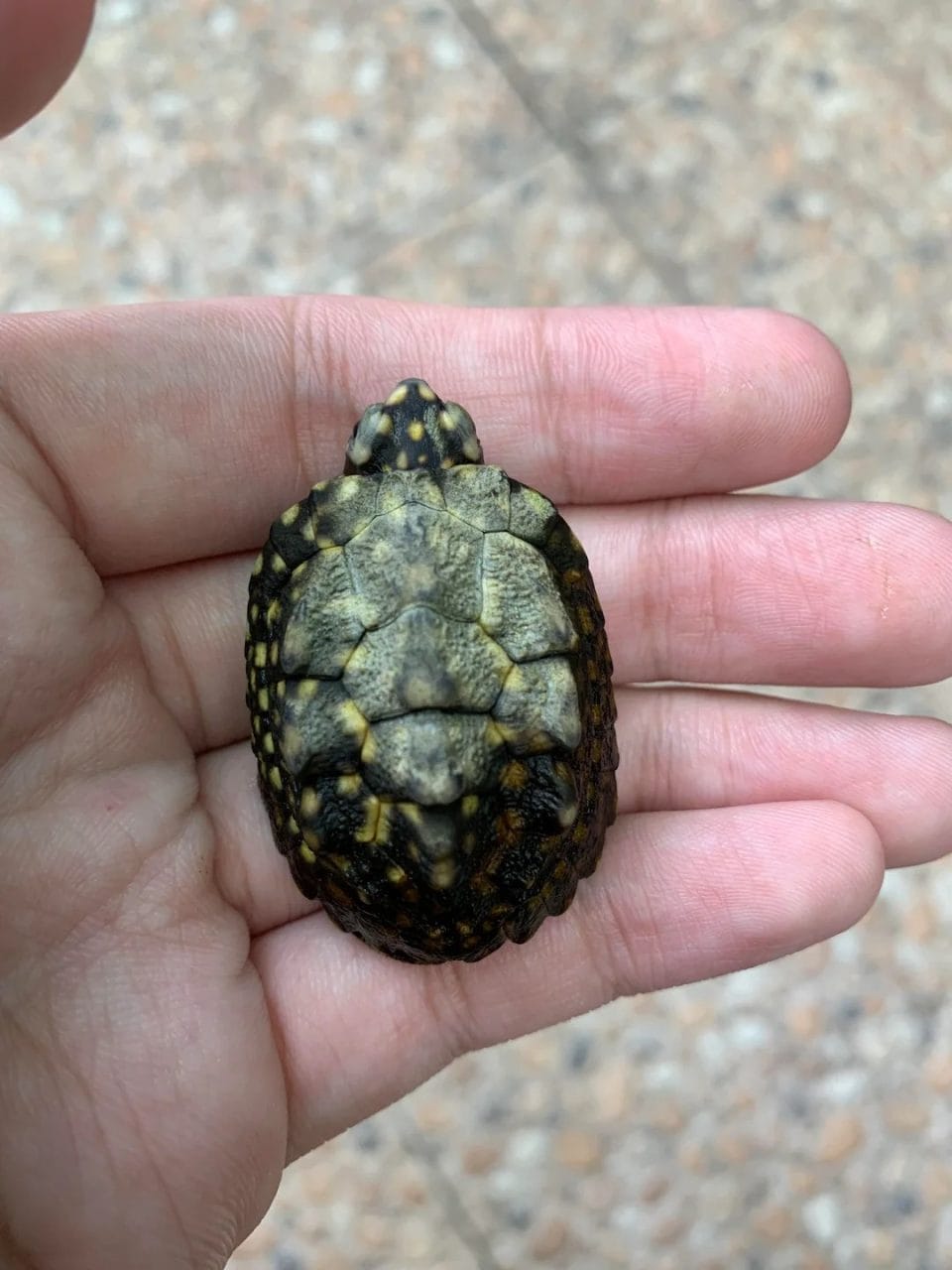
This Hilarious Turtle Book Might Know Your Pet Better Than You Do
Let’s be real—most turtle care guides feel like reading a textbook written by a sleep-deprived zookeeper.
This one’s not that.
Told from the snarky point of view of a grumpy, judgmental turtle, 21 Turtle Truths You’ll Never Read in a Care Guide is packed with sarcasm, sass, and surprisingly useful insights.
And hey—you don’t have to commit to the whole thing just yet.
Grab 2 free truths from the ebook and get a taste of what your turtle really thinks about your setup, your food choices, and that weird plastic palm tree.
It’s funny, it’s honest, and if you’ve ever owned a turtle who glares at you like you’re the problem—you’ll feel seen.
Who’s at Higher Risk?
Not everyone gets sick the same way. Some people can handle a few germs without a problem. Others? Not so lucky.
If you fall into any of these groups, you need to be extra careful around turtles:
- Kids under 5 – They love touching and kissing pets. Bad combo when it comes to bacteria.
- Pregnant women – Getting sick during pregnancy is a whole different level of risk.
- Elderly people – Weaker immune systems mean longer recovery time.
- People with health issues – Anyone with a condition that affects the immune system (like diabetes, cancer, or recent surgery) is more likely to get seriously sick.
Even if you’re healthy, germs don’t care. But if someone in your house fits one of these groups, keep them away from the turtle tank. Simple as that.
How Likely Are You to Get Sick?
Honestly? The risk is real, but it depends on how you handle your turtle.
The CDC says around 1 in 3 turtle owners who get Salmonella had direct contact with their pet. That’s a pretty big number.
In comparison, the general population has about a 1.2% annual infection rate. So if you own a turtle, your chances go up — especially if you don’t follow basic hygiene.
Now, not every turtle has Salmonella. But here’s the catch: you can’t tell by looking. Even clean-looking turtles can carry it.
The smaller the turtle, the riskier it gets. That’s why selling turtles under 4 inches has been banned in the U.S. since the 70s.
Bottom line — if you wash your hands, clean the tank regularly, and don’t treat your turtle like a stuffed animal, your risk stays low. But if you skip the basics, you’re asking for trouble.

How to Stay Safe While Owning a Turtle
Turtles can be great pets — if you handle them right. Here’s what I stick to so I don’t end up sick:
- Always wash your hands after touching your turtle, their tank, or anything inside it. Soap and water, not just a rinse.
- Don’t kiss or cuddle them. I know they look cute. Doesn’t matter.
- Keep turtles away from the kitchen. Never clean the tank or gear in a food prep area.
- Disinfect the tank weekly. Not just a water change — scrub the surfaces too.
- No turtles for small kids. Especially under age 5. Their hands go in their mouths constantly.
- Use gloves if your turtle is sick. Or if you’re cleaning something nasty like fungus or shell rot.
- Don’t mix them with other pets. They can pass stuff to other reptiles too.
If you treat your turtle like a wild animal that happens to live in your house, you’ll be fine. Respect the germs. That’s all.
Before handling a turtle with shell rot or skin fungus, understand proper treatment protocols to protect both you and your pet.
Can Turtles Make Other Turtles Sick?
Yes, they can — and it happens more often than you’d think.
Turtles can pass bacteria, viruses, and parasites to each other, especially when they share the same tank or basking spot.
If one turtle has Salmonella, respiratory infections, or parasites, the others are at risk too. Dirty water spreads it fast.
That’s why quarantine matters. If you bring home a new turtle, don’t toss it into the main tank right away.
Give it a few weeks in a separate setup and watch for signs of illness. It can save the rest of your turtles from a nasty outbreak.
Should Kids Be Allowed to Handle Turtles?
Not really — at least not without supervision.
Kids under 5 are the most at risk from turtle-related infections like Salmonella. They’re always touching stuff and then putting their hands in their mouths. That’s a recipe for getting sick.
Even older kids can be careless. They might forget to wash up or try to “play” with the turtle like it’s a toy. Turtles don’t like that, and bites can happen.
If you do let kids near turtles, make sure:
- They wash their hands right after.
- They don’t kiss or cuddle the turtle.
- You’re watching them the whole time.
Turtles are better for households where the adults do most of the care. Let the kids watch, but don’t let them take charge.
Regular health monitoring helps you catch problems early—familiarize yourself with common health issues in pet turtles to know what to watch for.

About Author
Muntaseer Rahman started keeping pet turtles back in 2013. He also owns the largest Turtle & Tortoise Facebook community in Bangladesh. These days he is mostly active on Facebook.


